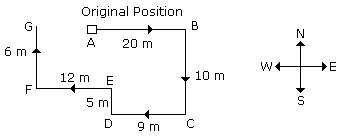Discussion
Home ‣ Verbal Reasoning ‣ Statement and Argument See What Others Are Saying!
- Question
- Statement:
Should system of offering jobs only to the wards of government employees be introduced in all government offices in India?
Argument:
I. No. It denies opportunity to many deserving individuals and government may stand to lose in the long run.
II. No. It is against the principle of equality. Does not government owe its responsibility to all its citizens?
Options- A. if only argument I is strong
- B. if only argument II are strong
- C. if either I or II is strong and
- D. if both I and II are strong.
- Correct Answer
-
ExplanationMerit, fair selection and equal opportunities for all - these three factors, if taken care of,can help government recruit competent officials and also fulfill the objectives of the Constitution. Thus,both the arguments hold strong.
- 1. P is related to Dena Bank in the same way as B is releated to PNB based on the given arrangement. Who amongst the following is D related to, following the same pattern?
Options- A. Syndicate Bank
- B. Canara Bank
- C. Bank of Maharashtra
- D. Indian Bank Discuss
- 2. NA
Options- A. 169
- B. 225
- C. 289
- D. 225 Discuss
- 3. 6, 13,28,59,?
Options- A. 111
- B. 113
- C. 114
- D. 122 Discuss
- 4. What is found necessarily in newspaper?
Options- A. Date
- B. Advertisement
- C. News
- D. Editor Discuss
- 5. 'Cub' is related to 'Tiger' in the same way as 'Kitten' is related to
Options- A. Dog
- B. Cat
- C. Duck
- D. Swan Discuss
- 6. Find the odd one out:
Options- A. Arc
- B. Diameter
- C. Diagonal
- D. Tangent Discuss
- 7. Sundar runs 20 m towards East and turns to right and runs 10 m. Then he turns to the right and runs 9 m. Again he turns to right and runs 5 m. After this he turns to left and runs 12 m and finally he turns to right and 6 m. Now to which direction is Sundar facing?
Options- A. East
- B. West
- C. North
- D. South Discuss
- 8. How many persons are seated between V and R?
Options- A. One
- B. Two
- C. Three
- D. Four Discuss
- 9. A river must have
Options- A. Fish
- B. Weeds
- C. Banks
- D. Boats Discuss
- 10. NA
Options- A. 46, 57
- B. 38, 49
- C. 41, 52
- D. 64, 73 Discuss
More questions
Correct Answer: Indian Bank
Explanation:
(d) is the right answer
Correct Answer: 225
Explanation:
Except '225' , all the other are perfect squares of natural numbers.
Correct Answer: 122
Explanation:
So, missing term = 59 x 2 + 4 = 122.
Correct Answer: News
Correct Answer: Cat
Explanation:
As 'Cub' is young one of 'Tiger' similarly 'Kitten' is young one of 'Cat'.
Correct Answer: Diagonal
Explanation:
Rest are the parts of a circle.
Correct Answer: North
Explanation:

Therefore, it is clear that Sundar will face towards North.
Correct Answer: Two
Explanation:
Row 1. ? P V S T R Q
Row 2. ? C F A E B D
(b)is the correct answer.
Correct Answer: Banks
Explanation:
A river must have its bank.
Correct Answer: 64, 73
Explanation:
Except '64,73', all are having difference of 11.
Comments
There are no comments.More in Verbal Reasoning:
Programming
Copyright ©CuriousTab. All rights reserved.
